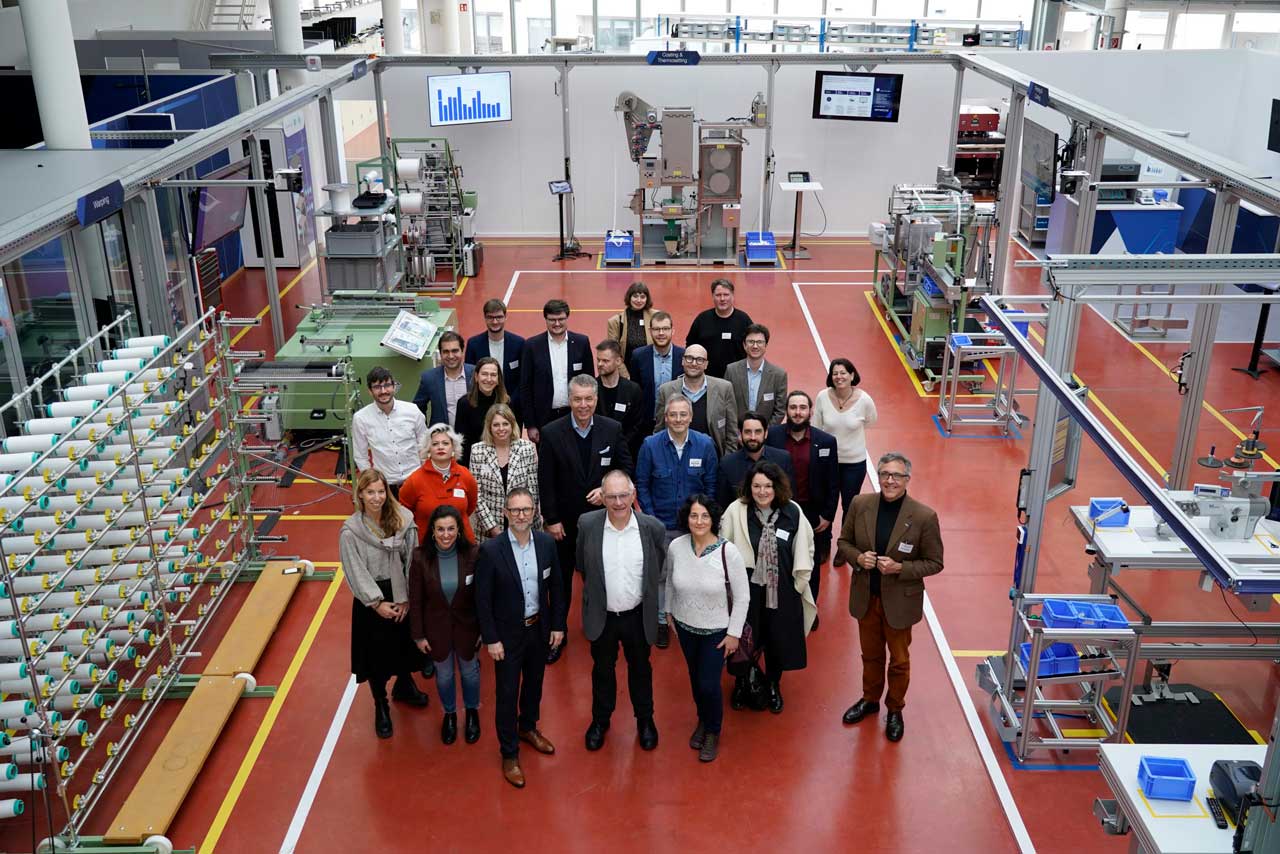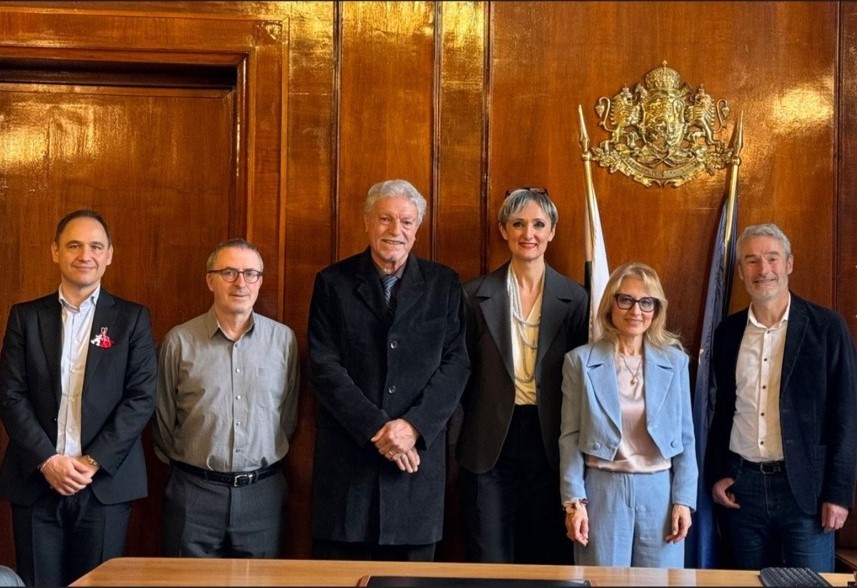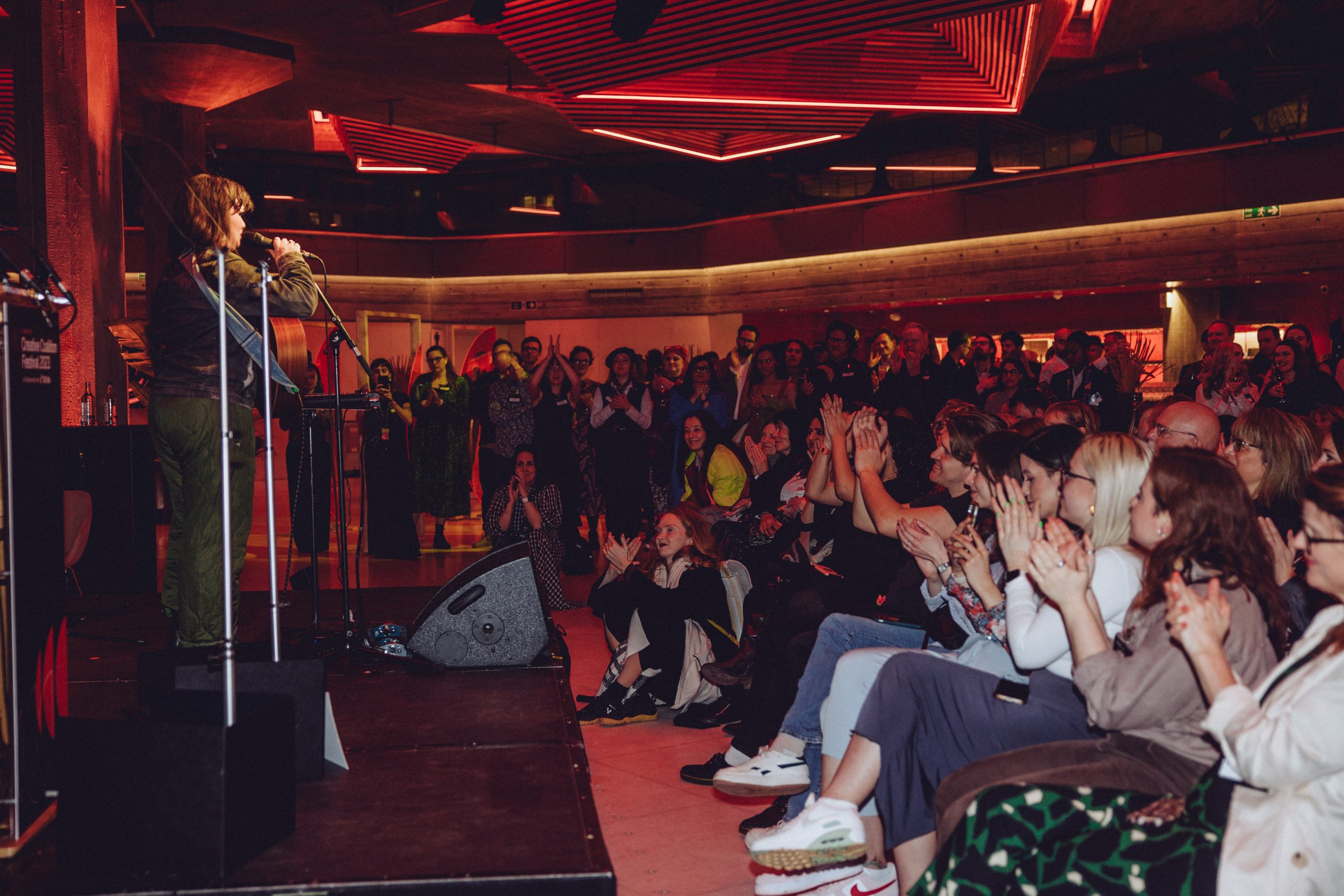EIT Culture & Creativity, EIT Manufacturing and EIT Climate KIC kicked-off the collaboration with a workshop held on the 3rd of March in the premises of the ITA Group – International Center for Sustainable Textiles of RWTH Aachen University.
The 1st EIT Innovation Agenda for Circular Textiles and Fashion workshop took place in Aachen, Germany on the 3rd of March 2023. Member of the EU Parliament Dr Christian Ehler participated in the kick-off along with the representatives of 20 different European expert organisations, including businesses, research centers, universities, and associations. They all came together to discuss shared challenges and opportunities of European textile and fashion sectors, and advocate for improved innovation funding mechanisms supporting transition pathways to circular models, and sustainable fashion production and consumptions patterns.
The event was co-organized by EIT Culture & Creativity, EIT Manufacturing and EIT Climate KIC, three of the nine Knowledge Innovation Communities (KICs) supported by the European Institute of Innovation and Technology (EIT), a body of the European Union.
“EIT Culture & Creativity is taking the lead in this initiative. Fashion is one of the largest creative sectors and employers in Europe. Fashion starts with design – the lifecycle and environmental impact of any product is determined at this very early stage. At the end of the chain, there is consumption. Other CCSI subsectors can actively contribute to more sustainable consumer behaviour. So we are taking this to heart for the benefit of European fashion companies, the consumers and the planet”
Bernd Fesel, interim CEO of EIT Culture & Creativity

Aligned with EIT KIC models, the EIT innovation Agenda for Circular Textile and Fashion will explore synergies in relations to innovations, training, and investments to accelerate its goals. The group supports the setting up of large demonstrators across Europe to test, validate and facilitate industrial uptake and replication as a critical step to meet circularity goals.
“The textile industry – and that refers to fashion as well as to industrial and technical textiles – is an important sector in the European manufacturing industry, but many production steps have been outsourced from Europe. This Innovation Agenda shall play a role in getting production back to Europe. At the same time, digital technologies such as AR/VR can help producing less textiles, for examples in a virtual showroom, in which people can see themselves in the clothes they want to shop. This could support the goal that less textiles are produced which go to the skip unused.”
Klaus Beetz, CEO EIT Manufacturing
During the workshop, the challenges regarding customer behaviour were brought to the table. According to EC reports, EU citizens dump 11 kg of clothes per year. The climate urgency requires decisive action in bringing people along with the change. In this sense, all three KICs are committed to explore joint programmes that incentivize innovation in the fashion and textile industries through cross-fertilization of innovators, talent, and businesses along the value chain.
“To change the industry, as well as consumer behaviour and expectations, we need systemic efforts that leverage design, media and creative arts just as much as material and digital technologies. Through this unique partnership of KICs, we are taking an integrated approach that has the potential to act as a blueprint for other complex and hard to abate sectors.”
Dr Kirsten Dunlop, CEO of EIT Climate-KIC
The group has established a timeline for delivering the EIT innovation Agenda on Circular Textiles and Fashion during 2023, in support of the EU Strategy for Sustainable and Circular Textiles, whereby: “By 2030 textile products placed on the EU market are long-lived and recyclable, to a great extent made of recycled fibres, free of hazardous substances and produced in respect of social rights and the environment. Consumers benefit longer from high quality affordable textiles, fast fashion is out of fashion, and economically profitable re-use and repair services are widely available. In a competitive, resilient and innovative textiles sector, producers take responsibility for their products along the value chain, including when they become waste.”

Considering the urgency to transform the current value creation processes for securing the future of the earth as a healthy biosphere, the organizers of the event, ITA Group has recently reinvented itself as “International Centre for Sustainable Textiles”. The main goal of the Centre is the holistic biotransformation of textile technology value creation processes, which includes the closing of raw material cycles, circularity of textile value chain and reduction of energy and water consumption, based on the principle of “design for recycling” as a fundamental paradigm of product development. The Centre with the motto “Textile Innovations: Sustainable. Digital. Individual.” is headed by Professor Thomas Gries, who believes that this workshop is the need of the hour.

About EIT Culture & Creativity
EIT Culture & Creativity is the ninth Innovation Community by the European Institute of Innovation and Technology (EIT), a body of the European Union. It is designed to strengthen and transform Europe’s Cultural and Creative Sectors and Industries (CCSI) by connecting creatives and organisations to Europe’s largest innovation network. It takes a holistic and open approach to innovation – from tech to artistic driven innovations, from business to citizen driven – and reinforces the appreciation and anchoring of European values and identities. EIT Culture & Creativity will unlock latent value from a multitude of small CCSI stakeholders through technology transfer, improved cross-sectoral collaboration and their effective integration in production value networks. EIT Culture & Creativity will support technology and business innovation; artistic innovation and social innovation. It will also harness the unique position of the CCSI to facilitate the Triple Transitions in Europe – green, digital and social.
About EIT Manufacturing
EIT Manufacturing is one of the nine innovation communities supported by the European Institute of Innovation and Technology (EIT), a body of the European Union. EIT Manufacturing’s main goal is to bring European stakeholders focused on manufacturing together in innovation ecosystems that add unique value to European products, processes and services and inspire the creation of globally competitive and sustainable manufacturing. EIT Manufacturing brings together more than 80 members (universities, research institutes and companies).
About EIT Climate KIC
EIT Climate-KIC is Europe’s leading climate innovation initiative, using systems innovation to catalyse change in cities, regions, industries and value chains. This means creating and connecting innovative solutions of today and tomorrow in integrated ways, and connecting stakeholders to learn from these solutions together. This place-based, ‘learning by doing’ approach uses innovation to drive change and support the kind of systemic transformation that will achieve net zero and regenerative living.
About The European Institute of Innovation and Technology (EIT)
The EIT is Europe’s largest innovation ecosystem bringing together close to 3,000 partners from top business, research and education organisations across Europe in over 80 innovation hubs. The EIT strengthens Europe’s ability to innovate by powering solutions to pressing global challenges and by nurturing entrepreneurial talent to create sustainable growth and skilled jobs in Europe. The EIT is an EU body and an integral part of Horizon Europe, the EU Framework Programme for Research and Innovation. The Institute supports dynamic pan-European partnerships, EIT Knowledge and Innovation Communities, composed of leading companies, research labs and universities each dedicated to solving a pressing global challenge, from climate change to health, to renewable energy.



